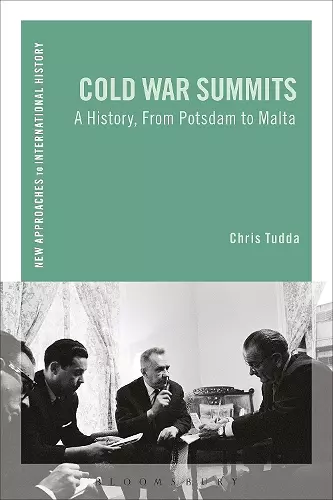Cold War Summits
A History, From Potsdam to Malta
Format:Paperback
Publisher:Bloomsbury Publishing PLC
Published:22nd Oct '15
Currently unavailable, and unfortunately no date known when it will be back

Examines summits from the beginning to the end of the Cold War, using a wide variety of documentary material from a number of international archives.
CHOICE Outstanding Academic Title 2016
This book examines six summits spanning the beginning and the end of the Cold War. Using declassified documents from U.S., British, and other archives, Chris Tudda shows how the Cold War developed from an ideological struggle between capitalism and communism into a truly global struggle. From Potsdam in 1945, to Malta in 1989, the nuclear superpowers met to determine how to end World War II, manage the arms race, and ultimately, end the Cold War. Meanwhile, the newly independent nations of the "Third World," including the People's Republic of China, became active and respected members of the international community determined to manage their own fates independent of the superpowers.
The six summits - Potsdam (1945), Bandung (1955), Glassboro (1967), Beijing (1972), Vienna (1972), and Malta (1989) - are here examined together in a single volume for the first time. An introductory essay provides a historiographical analysis of Cold War summitry, while the conclusion ties the summits together and demonstrates how the history of the Cold War can be understood not only by examining the meetings between the superpowers, but also by analyzing how the developing nations became agents of change and thus affected international relations.
Tudda (history, George Washington Univ.) has produced a book destined to become the benchmark work on the Cold War-era summits. Because of the book's excellent format, it is one of those rare historical works that will be accessible to beginning students, yet also of interest to experts in the field. Tudda covers all of the summits between 1945 and 1991 (Potsdam, Bandung, Glassboro, Beijing, Vienna, and Malta). Each chapter begins by setting the historical stage for the summit, enabling novices to better understand the issues and era in which the summit took place. Taken as a whole, these background pages form a history of cold war issues and relations between the Soviet Union and US, almost constituting a book within the book. Following the background information, Tudda provides detailed descriptions of the summit discussions between US presidents and Soviet premiers or other leaders. In addition to the US-Soviet summits, there are detailed descriptions of the Bandung Summit, which involved Asian and African leaders, as well as the Beijing Summit meetings that involved President Nixon and Mao Zedong. Tudda notes throughout the importance of summitry during the nuclear age, when building relationships between US and Soviet leaders helped reduce the danger of nuclear war. Summing Up: Essential. All academic levels/libraries. * CHOICE *
Aimed at providing ‘an introduction for researchers new to a topic ... and essential reading in classrooms’ (p. viii) this book does just that, and does it well. * Journal of Contemporary History *
Cold War summit diplomacy did matter and was mandatory for the survival of the planet due to the advent of the nuclear arms race. Chris Tudda's book meticulously recounts the conversations of world leaders and carefully contextualizes and analyzes six summits -- surprisingly including the meeting of Third World leaders at Bandung in 1955. The result is a compelling narrative demonstrating the power of personal diplomacy in taming Cold War conflicts. * Guenter Bischof, University Research & Marshall Plan Professor of History, University of New Orleans, USA *
A useful survey of some of the neglected summit conferences of the Cold War and of their place in history, based on official documents. * David Reynolds, Professor of International History, University of Cambridge, UK *
Chris Tudda’s Cold War Summits is more than tales from high-level talks. It is a history of the Cold War told through the key moments when leaders of extraordinary influence and power came together to solve, or at least to discuss, the great issues of their day. These were conversations that mattered, personalities that mattered, and ultimately, moments that helped the nuclear-tinged Cold War ultimately end without the bang the world feared. Well written, well researched, and insightful throughout, Tudda’s Cold War Summits belongs on every international historian’s shelf. * Jeffrey A. Engel, Southern Methodist University, USA *
ISBN: 9781472529589
Dimensions: 232mm x 150mm x 14mm
Weight: 360g
240 pages